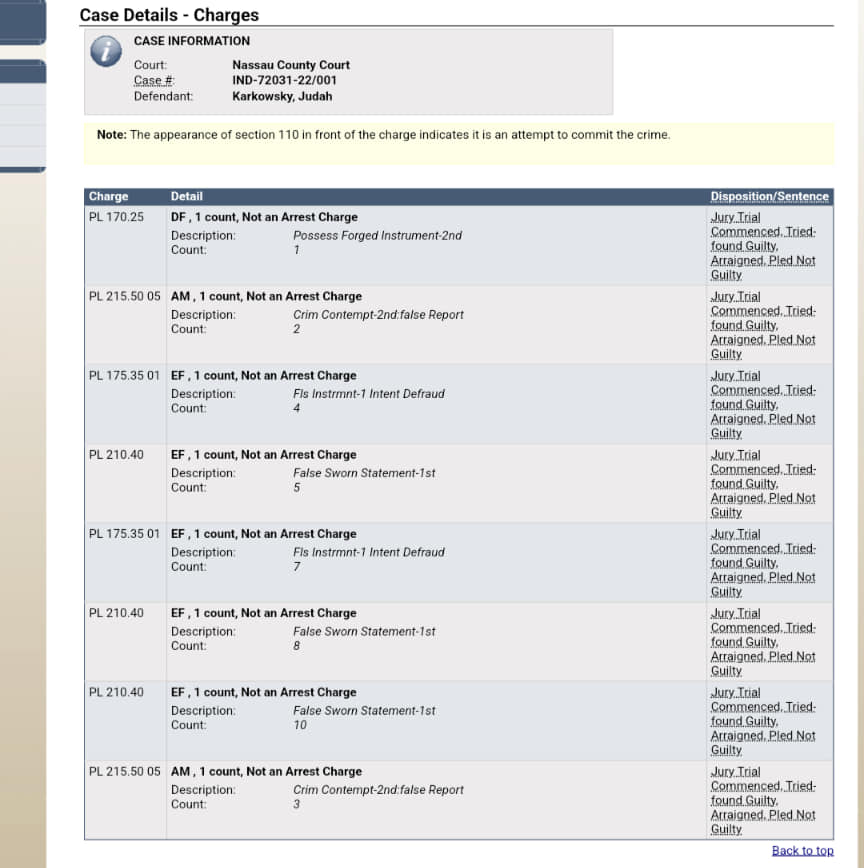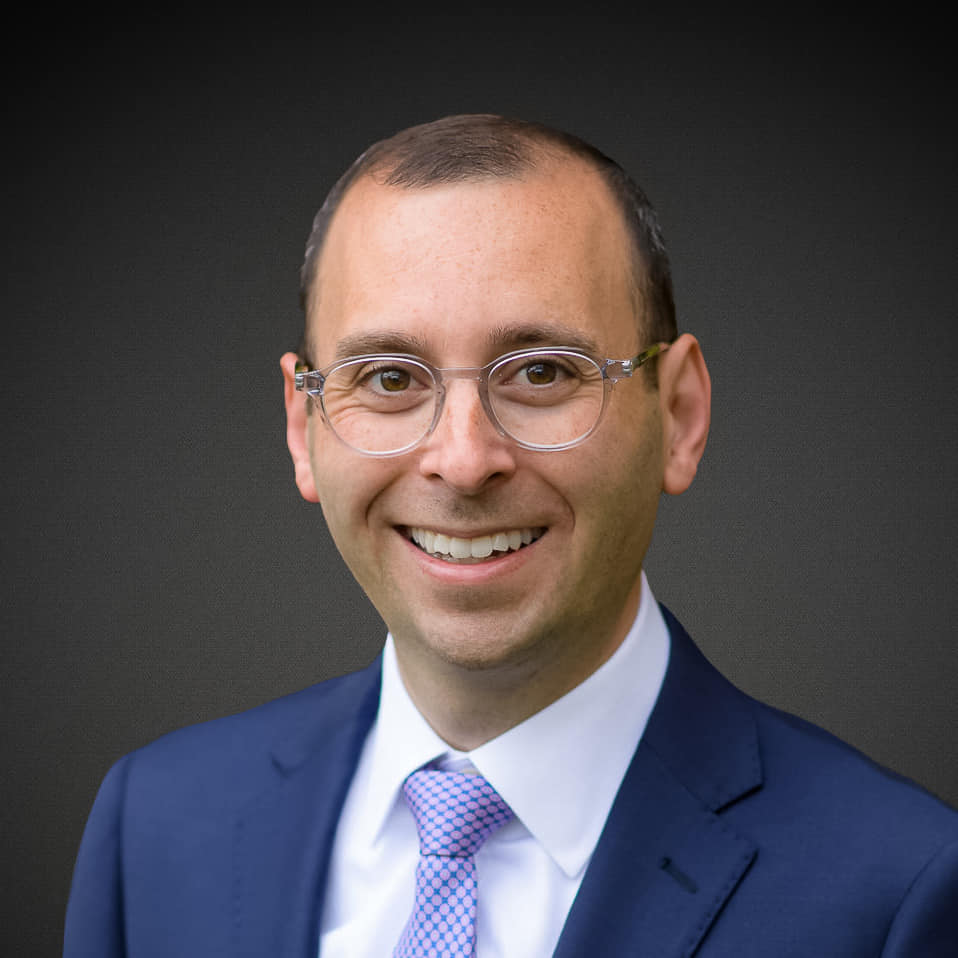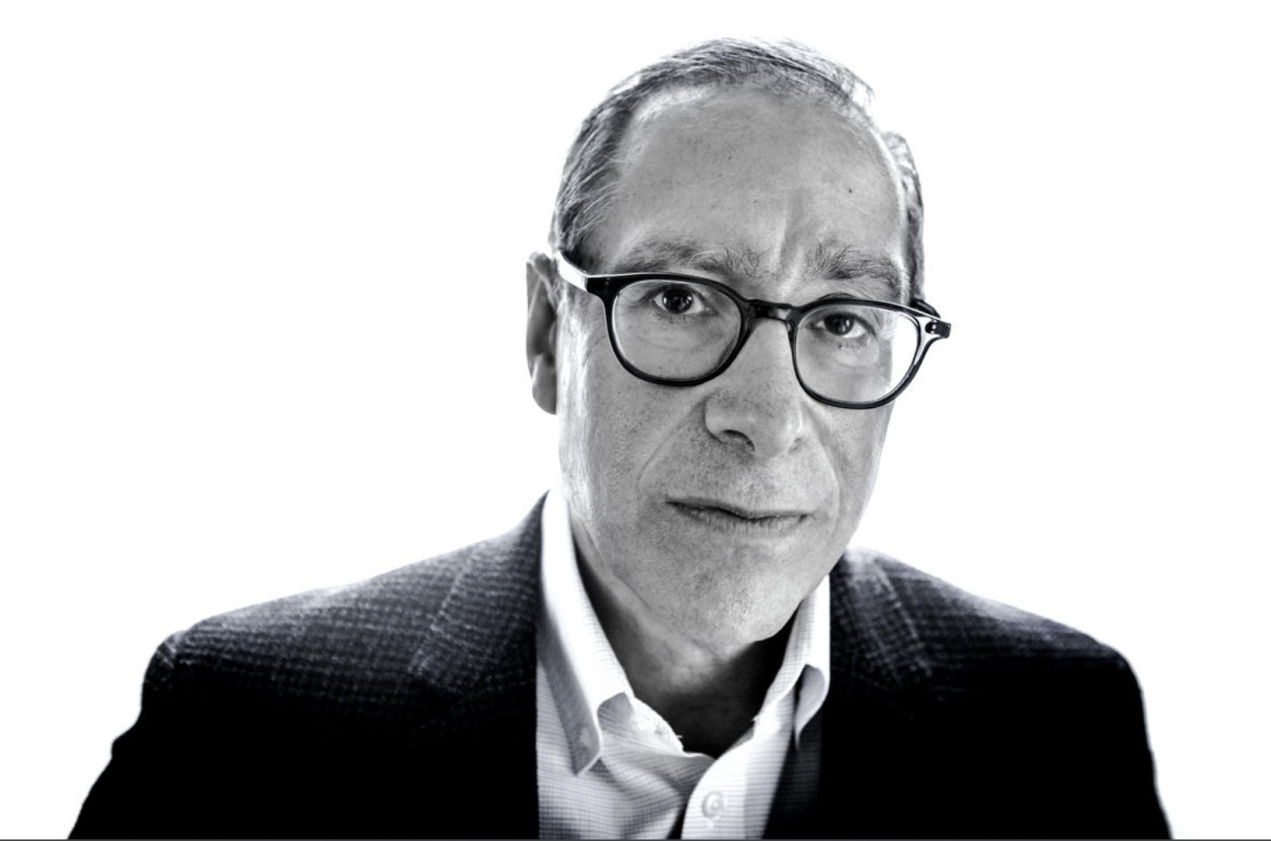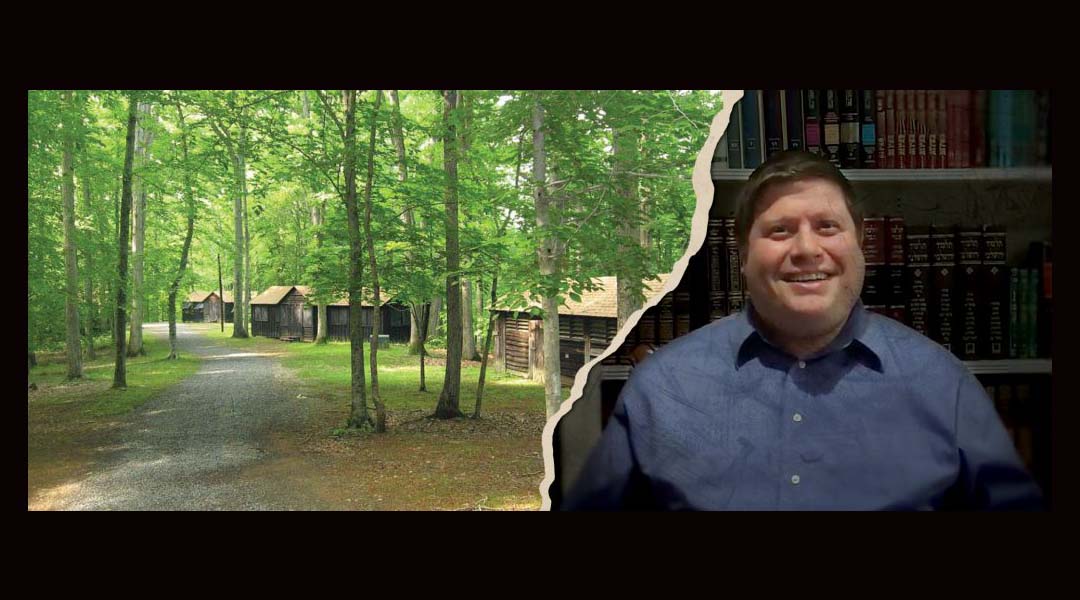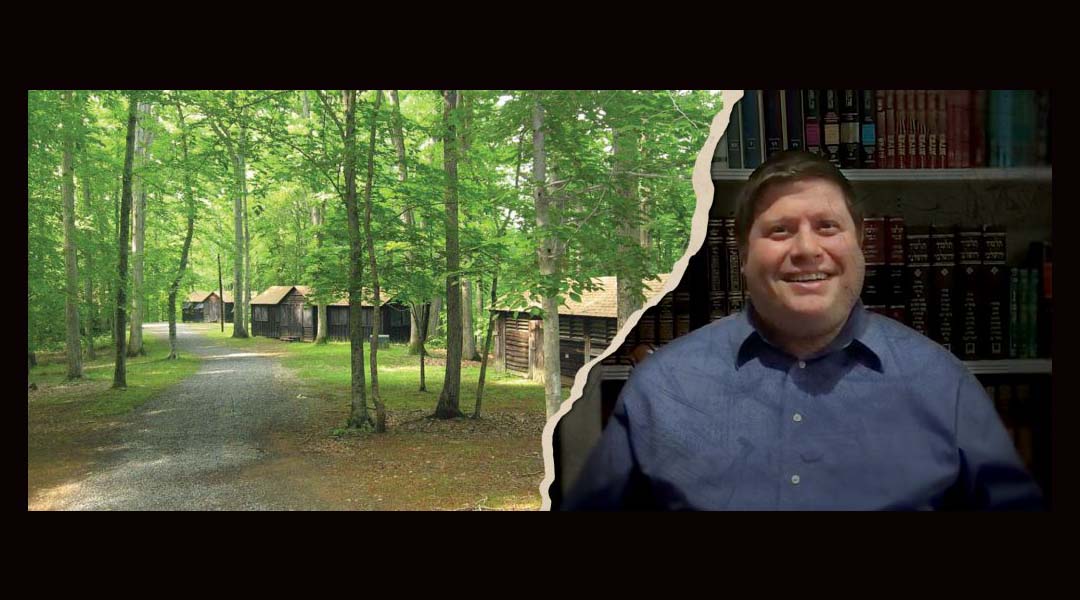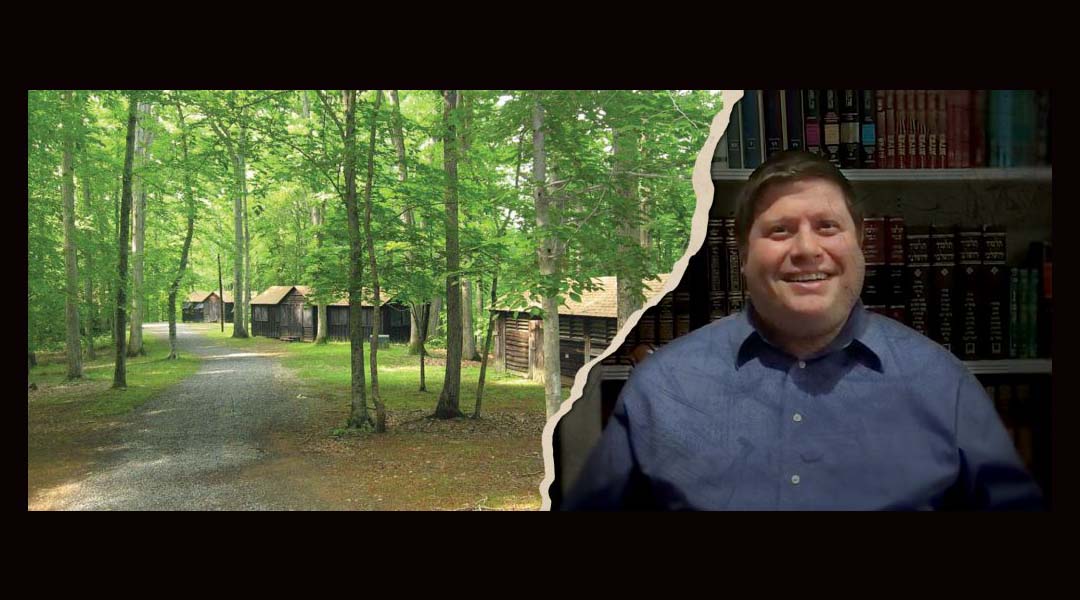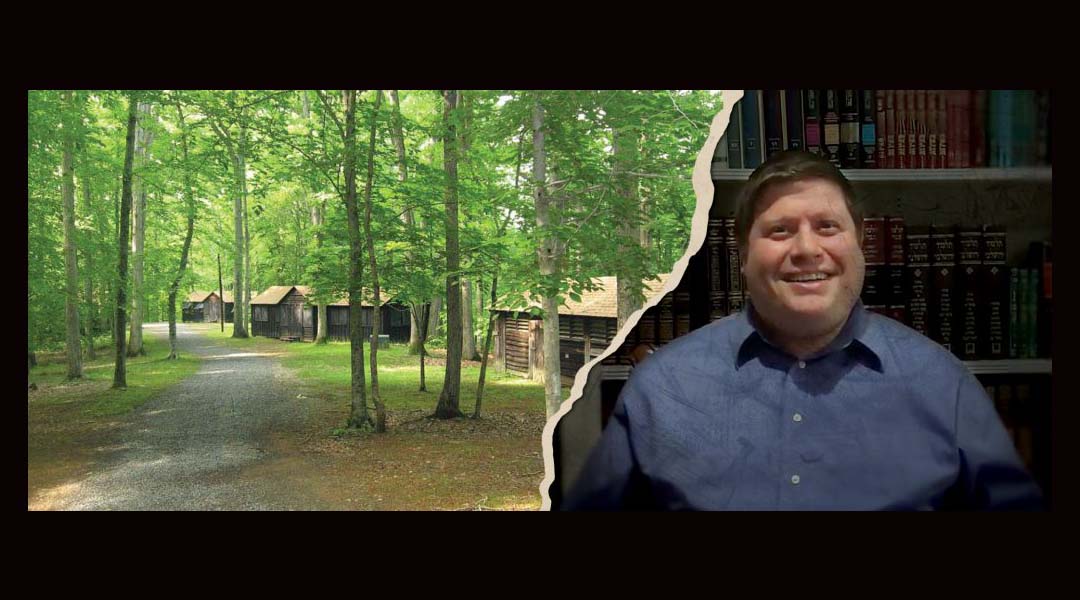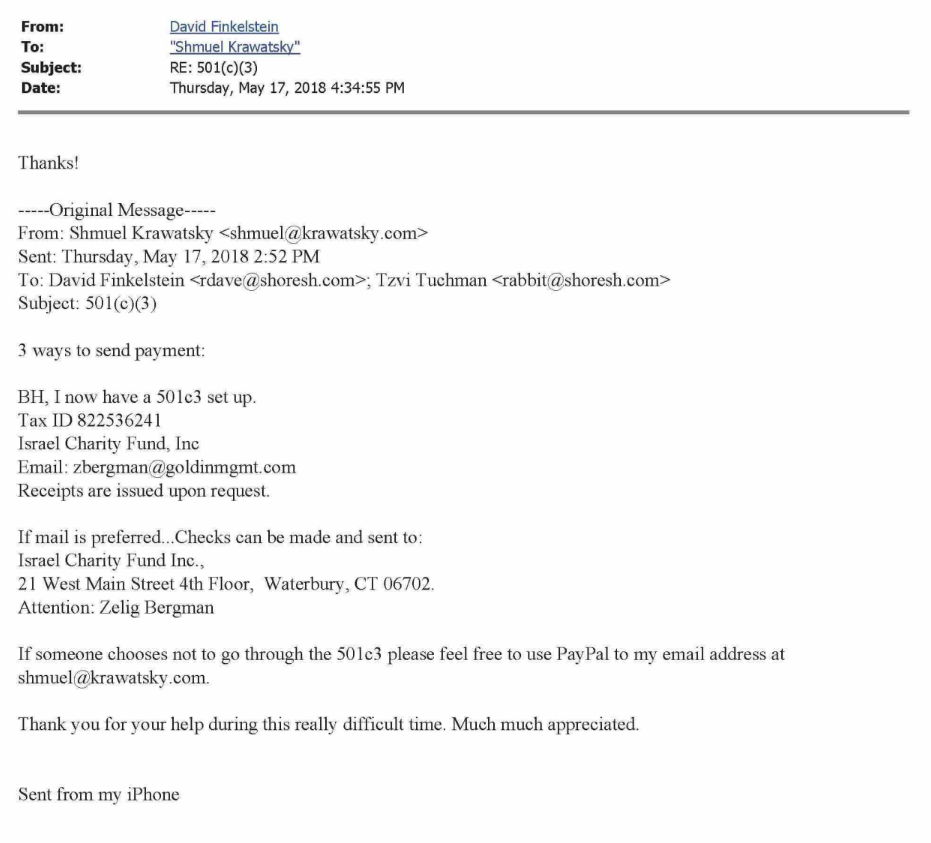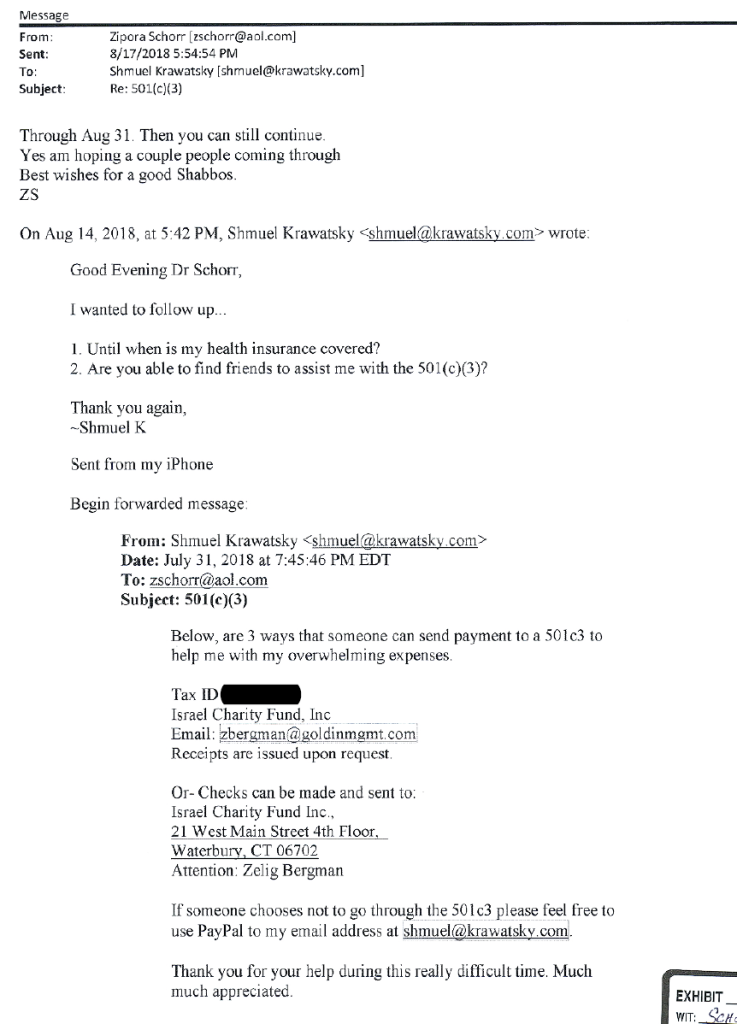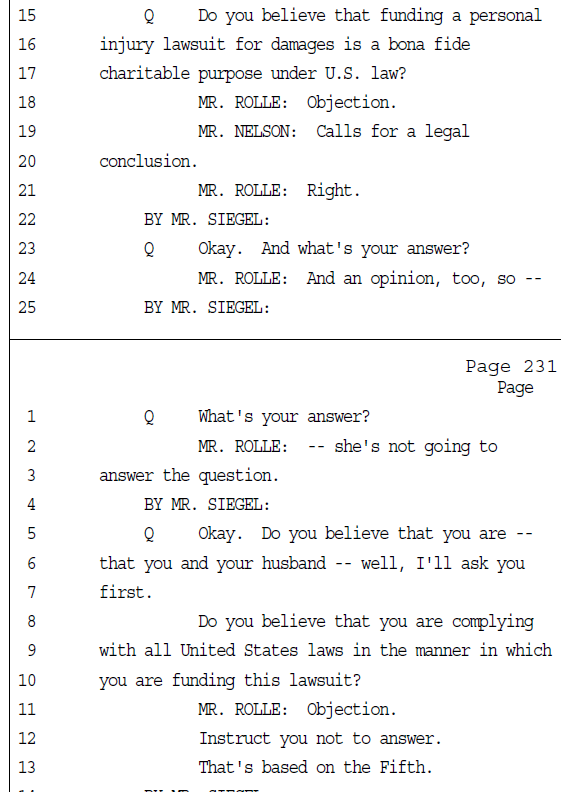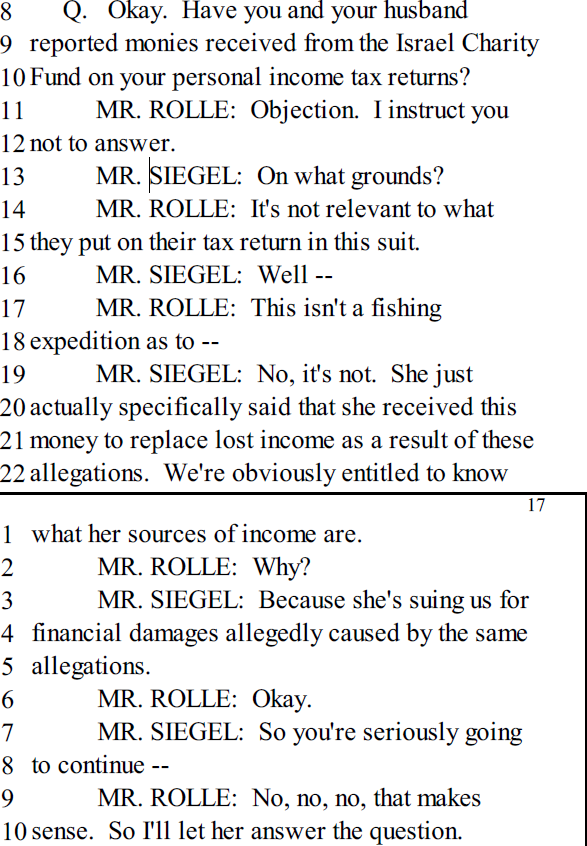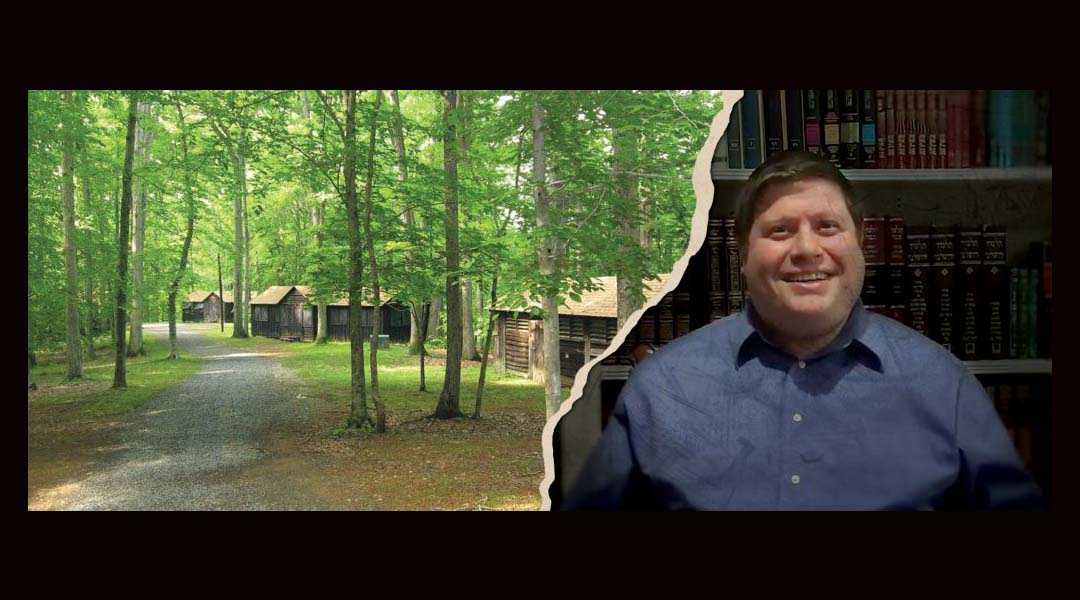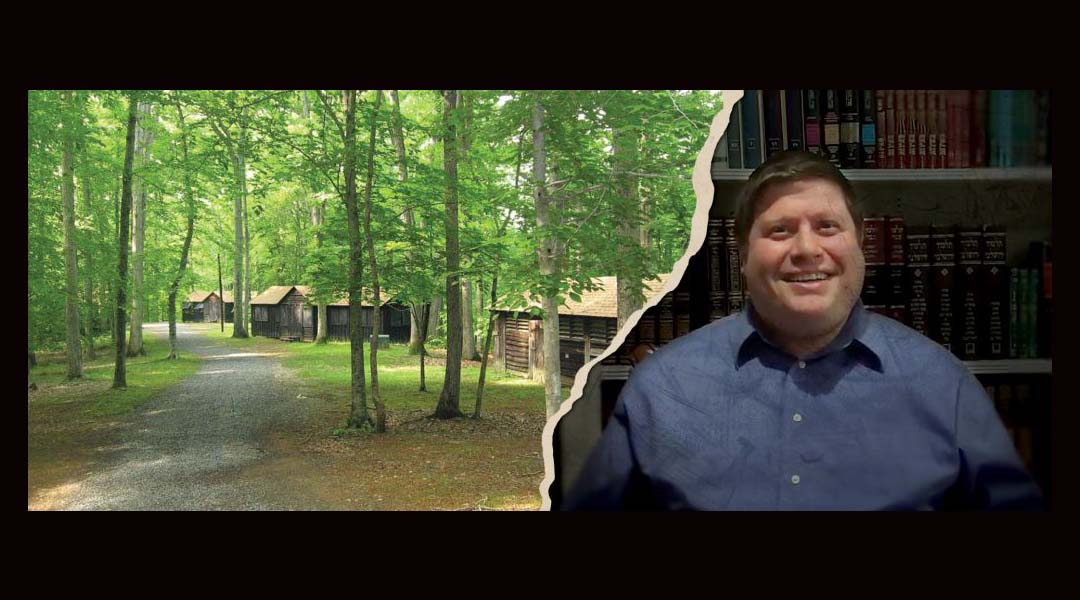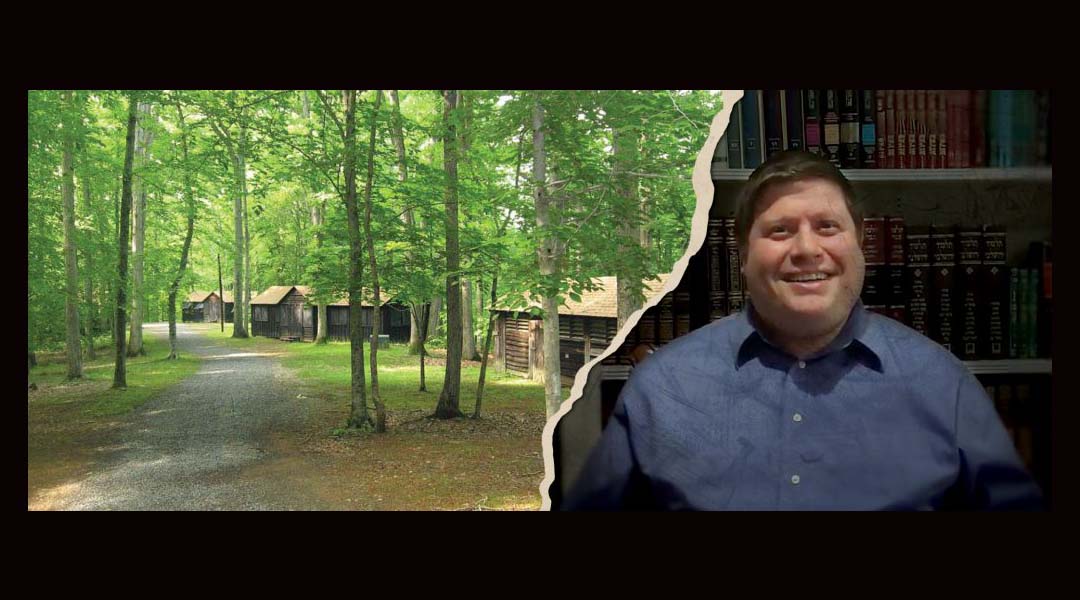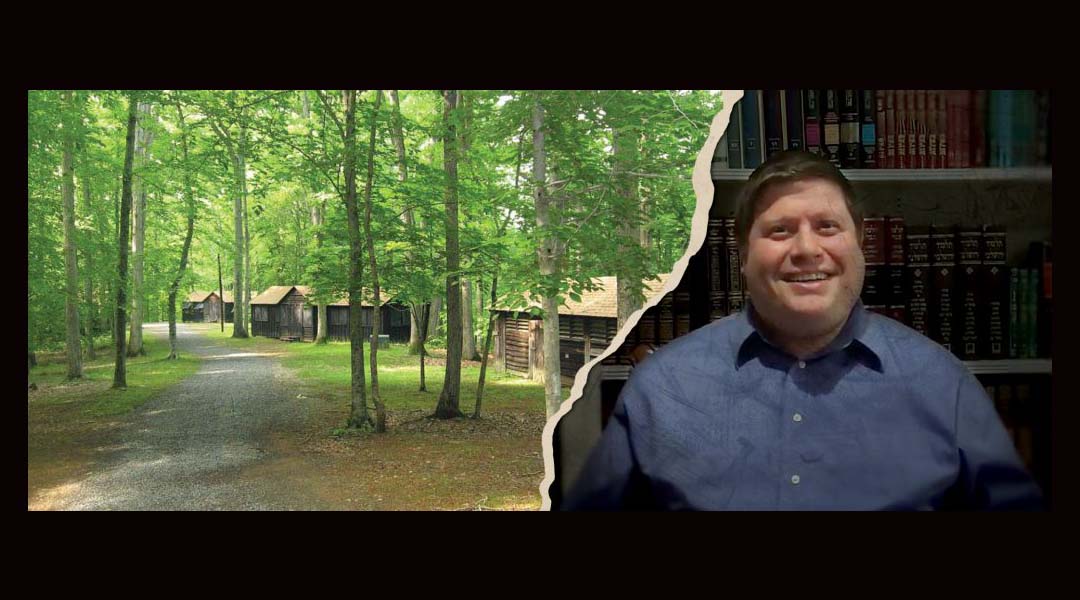The next witness was the father of two boys who attended Shoresh. One of his children is nonverbal and has Down Syndrome and had a paraprofessional shadowing him while he was at camp. He will be identified in these notes as Hersch, which is not his real name. His name was spoken in open court and is part of the public record, but it is being hidden here at my discretion to protect the identities of his children.
He said that he didn’t know any of the parents of the three alleged victims in this case. He said that he did know Rabbi Dave from when his children attended Shoresh. One of his sons, he said, attended Shoresh in 2014 and 2015, and his other son – the one who required the shadow – attended in 2015.
He said that his son is special needs, and has Down Syndrome, and at that point used very few words, mainly communicating using a limited number of single words. The first day his nonverbal son attended Shoresh, he said, Rabbi Dave called him and said that he wasn’t adjusting well and suggested that he hire a shadow for his son.
He said he doesn’t remember the shadow’s name, but he was 19, went by a hebrew name, was a big, heavyset guy, most likely in college but didn’t seem very sharp, so he got along well with his son. He said that for a number of years his son had carried a backpack full of Hot Wheels and other small cars that he’d take everywhere, both at home and at camp.
He said that his other son sometimes came home missing his underwear. He said that this was not the first camp he’d sent his kids to, and he’s sent them to many camps since, and nothing like that had ever happened at any other camps he’d sent his kids to before.
Direct examination ended and Chris Rolle cross examined Hersch.
Rolle asked him if the name of the shadow was Meir Samberg, and he said that sounded right.
Cross examination ended and Hersch was excused.
Next Jon Little called the first alleged victim.
Jon asked him what he likes doing for fun, and he said that he likes being outside and collecting rocks, and enjoys playing guitar. He said he is currently in 10th grade. In 2015, he said, he was around 7, and that summer at Shoresh was the his first time at camp. He said that on his first day, like any first day anywhere, he was getting used to what’s what there. His older brother and brother were also there, he said.
He said he occasionally saw his sister there but not much because the boys and girls were segregated. He said he also only occasionally saw his brother who is two years older than him. He remembered meeting Krawatsky, he said, and identified him in the courtroom. He remembers the first time meeting Krawatsky, he said, as being during davening in the morning. He said he remembered encountering Krawatsky in other places too, like the locker room.
His first time in the locker room, he said, he accidentally got water in his eyes in the pool and went into the locker room to get a towel which is when he walked in on Krawatsky with the second alleged victim. The second alleged victim, he said, was standing there nearby facing toward Krawatsky, and Krawatsky looked surprised and taken aback to see him, but smiled and didn’t seem to affected by his presence. He said that Krawatsky bet them $100 that neither of them would touch his penis.
He said that he himself didn’t touch it, but that the second alleged victim hesitantly put his hand on Krawatsky’s penis and moved his hand along it. Both of them, he said, were around 7 years old at the time. Before camp, he said, he hadn’t known either Krawatsky or the second alleged victim. When the second alleged victim moved his hand up and down Krawatsky’s penis, he said, Krawatsky ejaculated onto the second alleged victim’s hand and part of his arm.
Back in 2015, he said, he didn’t know what ejaculation was, and didn’t know what semen was, but he saw a substance go onto the second alleged victim’s arm.
After that, he said, he left the locker room afraid and not really sure what had happened. He said he was freaked out and didn’t know what to do, and before he left he saw Krawatsky grab the second alleged victim’s arm and pull him into a stall. He said he didn’t tell anyone when it happened because he was scared and hadn’t really understood what had happened, he was 7 and didn’t know much of anything and didn’t know if anyone would believe him.
He said he saw Krawatsky again when Krawatsky spoke to him and told him to come into the locker room during swim a few days later. He said he complied because he was freaked out and was afraid Krawatsky would get angry if he didn’t. He said he entered the locker room and saw Krawatsky in there naked, the second alleged victim was there too, and when he entered Krawatsky said hi to him and bet the two boys $20 that neither would touch his penis. He said that he hesitantly touched Krawatsky’s penis at first and then pulled his hands away, but Krawatsky grabbed his hands and forced them onto his penis.
He said that Krawatsky forced him to move his hands up and down his penis until Krawatsky ejaculated onto arm. Again he reiterated that he didn’t know what masturbation or ejaculate was at the time. He said he had been wearing a green paper wristband on his arm, the kind you get as a pass at attractions (according to previous testimony such wristbands were given to kids who were going to swim in the pool). Following that incident, he said, Krawatsky pulled the first alleged victim into a stall, and he left and went into the pool to wash the semen off his arm.
He said he had another encounter in the Shoresh locker room a few days later when Krawatsky told him on the way to the locker room to come on during swim “or else.” He said he complied because he was scared. He said he felt violated and out of control and new he didn’t want that done to him again, but felt afraid and intimidated by Krawatsky since he was small and Krawatsky was bigger and older than him. He said that even now he may be intimidated enough by such a scenario to comply with it.
He said that at the time he was Orthodox and respected rabbis. He went in, he said, and saw Krawatsky standing there naked, and that it looked like the second alleged victim had arrived before him. This time, he said, Krawatsky bet them $150 that neither of them would stick their hands up his butt, but neither boy did it. He said that in response to their defiance Krawatsky said they were the worst kids for not listening, and that he picked up the second alleged victim, pulled off his swimsuit, and raped his anus. He said that the second alleged victim was being held away from Krawatsky with his back to Krawatsky and that Krawatsky had an erect penis and put it in the second alleged victim’s anus.
He said the second alleged victim looked terrified, was crying, and shaking a little, and that Krawatsky went on for a minute or two – he wasn’t counting – and when he was done he put the boy down and said that what he had just done to him was normal and that if either of them told anyone what he’d done they would do the same to them.
He said that Krawatsky told him to come into the locker room the day before the camp Shabbaton. He said he went down to the pool area to try and get his brother’s attention to tell him about what had happened, but his brother was preoccupied with basketball in the pool so he talked himself out of telling his brother because he was afraid.
He said he only attended Shoresh for the first session in 2015.
He said he again encountered Krawatsky that summer the night before the Shabbaton when he came into the locker room as Krawatsky had instructed. He said Krawatsky was there wearing nothing, the second alleged victim was there, and Krawatsky told them that they were terrible for not listening to him. He said that Krawatsky told them they were bad, and picked up the second alleged victim so his back was against Krawatsky, pulled down the boy’s swimsuit, and then put his penis in the boy.
He said that Krawatsky then put the boy down then picked up his phone and took a picture of the boy putting his swimsuit back on. He said the second alleged victim was terrified, whimpering, sad, and afraid. He said Krawatsky then picked him up, pulled down his swimsuit, and raped him while his back was toward Krawatsky. He said Krawatsky penetrated his anus most of the way in. He said he felt really bad, that he was shaking, and scared. He said Krawatsky then out him down, his penis was shaking, and then he took a picture of him trying to put on his swimsuit. He said he didn’t remember that time if Krawatsky ejaculated on or in either them.
He said he remembered feeling physically violated, remembered bleeding onto his swimsuit, and feeling physically disgusted with himself and what happened, and that after that he felt gross and disgusting. He said he went back to the pool feeling shaken up and afraid, not knowing what to do, and that Krawatsky had reiterated his threat that if they told anyone that person would do the same to them as Krawatsky had done.
He said that he never consented to any of it (not that he would have had to, children are incapable of consenting to sexual activity with adults).
After Krawatsky raped him, he said, he tried to find his brother but didn’t succeed in finding him. He said that after all four incidents he told no one. He said he had other interactions with Krawatsky at Shoresh that summer. One day during davening, he said, he was running around and Krawatsky came over to him, grabbed him, told him he was the worst kid ever for not doing as he was told, and shook him. He said that he was Orthodox at the time and prayers were important, and that he had interrupted prayers.
He said he remembered one time on the soccer field, when he got stung by a bee, that Krawatsky came over and said he wanted to take him to the nurse and seemed agitated. He said he didn’t want to go with Krawatsky because Krawatsky had hurt him, and he was scared to go with him. He said another counselor ended up taking him to the nurse.
He said he remembered one other time strongly that when they were ziplining in camp and he was coming off the zipline, he banged his knee on the ground and was in pain. He said that Krawatsky was nearby supervising an activity and tried to take him to the nurse, but he was too scared and refused to go with Krawatsky because he was scared, so eventually he just said he was ok and ran back to the line to go again.
He said he eventually told his mom at first, after he left Shoresh, that he’d dreamed that Krawatsky had peed in front of him. (Its possible that such a dream is how a child’s mind would represent witnessing an adult ejaculating in front of him.) At the time, he said, he didn’t understand what ejaculation was. He said his mother seemed freaked out and asked if he’d ever seen something like that happened. He said he told her about the first incident with Krawatsky where he bet them $100 that neither of them would touch his penis. He said he then had to tell the story again to his father.
He said that after that his father told Rabbi Dave about it at the Rabbi’s house on Shabbos day. He said he remembered that Rabbi Dave reacted not compassionately, and kept asking him about other people who were there. He said he told Rabbi Dave about the second alleged victim, but Rabbi Dave said that Krawatsky was probably joking, and not serious about what he’d done to them.
He said Rabbi Dave didn’t seem aggressive at the time. He said he had to tell his story again to Shannon Pulsipher, the CPS worker, and he told her the same thing he told Rabbi Dave, about the incident where Krawatsky offered them $100 to touch his penis. He said that when he told Pulsipher no one was in the room but the two of them. He said he was introduced to detective Davies outside the room.
He said he had to tell the story again in the Shoresh locker room when he was there with Pulsipher, Davies, and Rabbi Dave. He said he felt terrified coming back to the locker room. He said he had finally gotten some level of parents acknowledging what had happened, but he was scared and hadn’t wanted to go back to where the abuse had happened.
He remembered Davies having a gun. When Shannon Pulsipher left the locker room, he said, and he was left to talk to Davies and Rabbi Dave, Davies pulled his gun out of its holster and pointed it toward the ground. He said that Rabbi Dave said not to repeat anything that happened there and to stop talking about it. He was terrified, he said, a month prior he’d been violated in that room and now he was back being threatened.
Regarding the playdates he said he saw the second alleged victim in the room with him at the therapist’s office, with the therapist present. The first time, he said, he didn’t remember discussing what happened, just playing game. The second time, he said, he said what had happened to him at camp regarding Krawatsky offering them money to touch his penis.
Moving on to his cousin, the third alleged victim, he said that he knew his cousin, and that they had a sleepover together the night before he moved to Atlanta. That night he said he woke up with his pants pilled down in bed, and his cousin was rubbing his erect penis against his butt. He said is cousin hadn’t penetrated him and that he didn’t say anything at the time to anyone because he was scared, but eventually told one of his parents and his therapist.
Since that incident, he said, he hadn’t seen or spoken to his cousin. Regarding the second alleged victim he said that he doesn’t remember seeing or speaking to him since the playdates except for one time when the second alleged victim and his family came to visit them in Atlanta, but not in the last 5 years. He said that his family moved down to Atlanta in 2016 before he had disclosed the rapes. First time he remembered disclosing that, he said, was to his parents, he thinks, in 2018.
He said he told both his last and current therapists about the rapes. He said he had been deposed in both 2019 and 2023.
Regarding his triggers he said he still doesn’t like wearing paper wristbands, at Skyzone or anything like that. It’s something he has to think about, he said, and plan around if he knows he’ll be somewhere that gives him one, how to avoid wearing it on his wrist.
In 2015 after the rape at Shoresh, he said, he was scared of going into public locker rooms in general because of what happened at Shoresh. He said it’s gotten easier with age and time and general exposure to use public restrooms, but still to this day he feels more comfortable using a stall than a urinal. He said it wasn’t like that before the abuse.
Regarding his testimony he said he was testifying not because anyone made him, and not to please his mother, but for no other reason than to tell the truth.
Direct examination ended and Benjamin Kurtz cross examined the first alleged victim.
Kurtz began by asking him if his disclosure to his mother came, to the best of his recollection, after his friend, the second alleged victim, had been expelled from camp and he said he didn’t remember, but acknowledged it was plausible. Kurtz asked him if they were good friends, and he said he was friendly. Kurtz asked for him to describe his level of friendship with the second alleged victim and he said that he wouldn’t describe a 7 year olds who spent one month together as very good friends, but friends.
Kurtz asked him how many days a week was and he said 5. Kurtz then asked if he went every day and he said he didn’t remember which days he missed, but he believed he missed a couple of days. Kurtz asked him if out of 20 days he’d have hung out with his friend for 18 and then asked him if those 18 days were enough to become so worried about him over what happened with Krawatsky that he wanted to help him get through it, and he said yes.
Kurtz asked him if he’d seen his friend be violated multiple times and was concerned and wanted to help his friend get his truth out, and he said yes. Kurtz asked him if he thought he was going to help his friend with the help of his parents, and he said he was scared to tell his parents and didn’t know what to do, so he doesn’t know if it was to help his friend tell his story.
Kurtz asked him if before he went to the playdates the therapist had arranged a cue with him to start talking about what had happened to him with his friend, and he said no but he was told the meeting would partially be about what happened at camp. Kurtz asked him if he remembered being told to ask his friend if he remembered what happened at camp, and he said he remembered being told to tell the truth, and that he had.
Kurtz then asked him if when he said what happened at camp his friend had said it didn’t happen, and he said he didn’t remember his friend’s exact reaction but he seemed surprised that it was brought up. Kurtz asked him to clarify if he meant surprised it came up or surprised at all, and he said the former. Kurtz asked him if his friend responded saying it didn’t happen repeatedly, and he said he didn’t remember his friend’s response exactly as it was 10 years ago.
Kurtz asked him if he would remember if he saw a video of that day, and he said that it likely would. Kurtz asked him if he remembered being taped at the second playdate, and he said he didn’t remember which one was taped, but was on some level aware that the playdates were being taped.
Kurtz then played a video of the meeting with him, his friend, and the therapist. (The audio wasn’t very clear, so I’ll be recounting what I was able to hear.) The video showed him talking about having been offered $100 in the locker room to touch Krawatsky’s penis, and the second alleged victim expresses surprise and says he wouldn’t do that. The second alleged victim is heard on the video denying what the first alleged victim had said, and acting dismissive of it. The second alleged victim is then heard saying that it wasn’t true, and that (Krawatsky) didn’t even have $100.
Kurtz then asked him if he heard his friend’s multiple denials in that video, and he said yes. Kurtz asked him if after that meeting he remembered going elsewhere in the therapist’s office, and he said maybe the waiting room. Kurtz asked him if he remembered his mother talking to his friend, and he said no.
Going back to Shoresh, Kurtz asked him if he agrees that when he first disclosed to his mother it was that Krawatsky had offered him and his friend $100 to touch his penis, and he said he remembered telling her that. Kurtz asked him if he remembered telling his mother about any anal rape, or about his friend being there, and he said not initially, and that he hadn’t told Pulsipher either. Kurtz asked him if this was in 2015, and he said yes.
Kurtz asked him if this was after everything had happened that his friend said nothing happened, and he said yes. Kurtz asked him if he was told by his parents to bring it up, and he said he was told it would be brought up. (In this retelling I’m phrasing it like questions Kurtz is asking, but in reality he was throwing assumptions at the first alleged victim and hoping they would stick. For example, that last question was more like Kurtz making a statement And you were told by your parents to bring it up” implying that the first alleged victim was being used as a set piece with a specific part to play by his mother to elicit a specific response.)
“Going back to your disclosure, or whatever, story,” Kurtz began, and then asked him if when Pulsipher and Davies had taken him to the locker room Rabbi Dave was there too, and he said yes, that Shannon had gone out to his father leaving him inside with Rabbi Dave and Davies.
Kurtz then asked him about a trauma narrative he’d written for his therapist, and he said that he had dictated but his therapist had written it. Kurtz asked him if he had dictated that Davies had taken him to Shoresh to point out where things happened and Davies asked for a moment alone and Shannon left, and he said yes. Kurtz pointed out to him that it didn’t say there that Rabbi Dave was there and asked him if he’d forgotten that detail or if it was new.
He said it was 6-7 years ago and he didn’t remember all the details of himself talking about the events that happened, so he probably just forgot to say at the time because it wasn’t an easy process to go through. He said it had taken a while so if the trauma narrative wasn’t perfect that’s because it was a way to deal with the trauma, and wasn’t meant to be a perfect retelling.
Kurtz then asked him some detailed questions about the threats he’d said Davies had made against him, including whether Davies had threatened to kill his parents and his frogs, and he said he didn’t remember exactly how he’d dictated it at the time and that when he was 9 he had a tank of frogs that kept dying so he convinced himself that Davies was killing them because he was freaked out and didn’t know much better. Kurtz asked him if he was looking for answers, and he said sure.
Kurtz asked him if he’d said he was worried Davies would come kill him and he said he believed so, but that he didn’t really believe Davies was going to come to his house and kill him, and if Davies asked other cops to shoot him they’d call the FBI. He said that this was all part of him dealing with his trauma 6 years earlier, and that he didn’t remember exactly.
Regarding the rapes of him and his friend, Kurtz asked him if the date of disclosure being November 9, 2017 sounded right, and he responded with an uncertain “sure?” Kurtz then asked him if the day he made those allegations was the same day his mom had confronted him about searching for porn, and he said yes.
Kurtz asked him if he had admitted to searching for porn because he said he was looking for pictures Krawatsky had taken of him, and he said that he had, but when he saw the actual porn he was horrified by what he saw and clicked away. Kurtz then essentially asked him if he had made up the whole thing about rapes to avoid getting in trouble for looking up porn, and he said it wasn’t because he was in trouble, it was because he was scared already and after therapy that day he decided to disclose. Kurtz asked him to confirm it was the same day, and he said yes.
Kurtz then asked him what his mother’s reaction was, if she had showed him love, hugged him, and the like, and he said he didn’t remember her response. Kurtz asked him how much trouble he was in from watching porn, and he said he wasn’t watching it, he was trying to find pictures taken of him. He said his mother hadn’t gotten him in trouble, she was just concerned, and they scheduled a session with this therapist and discussed it. He said she was more concerned and wasn’t looking to punish him but help him.
Kurtz then asked him if when he disclosed after the porn she was concerned about getting him better, and he said that she was concerned about helping him process events he’d talked about before. Kurtz then clarified that he was talking about the rapings (this was the kind of cavalier insensitive way he talked about this when questioning this alleged victim, just casually referring to “rapings”) because the allegations had evolved from $100 offered to touch Krawatsky’s penis to rape, and he said he believed he had already disclosed some of the rape prior to that day and had disclosed other incidents before then, but in addition he had disclosed that Krawatsky had taken pictures.
Kurtz then said he had already asked him if that day was when he disclosed, and asked him if he was now saying he had disclosed earlier, and he said that he had disclosed one incident earlier to his mom or therapist. Kurtz asked him if his mom had called CPS or something, and he said he didn’t know but that he did know he disclosed about Krawatsky raping his friend before then.
Cross examination ended and Jon Little redirected.
Jon asked him if he recalls November of 2017 as being the date when his trauma narrative was written, and he said that the narrative had taken place over a long period of time. Jon then asked him about his former therapist and current therapist who he started seeing after he moved to Atlanta, and then asked him if he remembered around when he started with the new therapist, and he said he didn’t remember the exact year but remembered that it was around 2017 and 2018, maybe later.
Jon then asked him if he had still been worried about his friend because Krawatsky had raped him, and he said he’s been concerned for his friend for the last 9 years. Jon asked him if he remembered first telling his first therapist about his friend being raped, and he said he didn’t remember the exact date. Jon then showed him a copy of his first therapist’s records to refresh his memory, and he said it was the 8th of February, 2017. Jon asked him to confirm that that was 9 months before the trauma narrative was written, and he did.
Jon asked him if he remembered getting into trouble for looking at porn, and he said no. Jon then asked him why he was looking at porn, and he said that he was trying to find the pictures Krawatsky had taken of him and his friend.
Redirect ended and he was excused from the stand.
Next Jon Little called Dr. Drew Barzman. Barzman has an MD in Psychiatry and is certified in psychiatry, forensic psychiatry, and child and adolescent psychiatry. He is Director of Child and Adolescent Forensic Psychiatry Services at Cincinnati Children’s hospital, and Professor of Psychiatry and Behavioral Neuroscience at University of Cincinnati. He has treated child victims of sexual abuse and trama for over 20 years, an estimated 400-800 children a year, and has conducted about 100 or so forensic evaluations a year.
Dr. Barzman also has a research doctorate and publishes about child sexual abuse and trauma.
He was accepted by the court as an expert in general, child, and forensic psychiatry.
He said he had worked on criminal cases, and has worked with a few state prosecutors in Ohio and Indiana, and has also worked on behalf of defendants, and in civil cases on both sides. He said he was being paid $37,000 as an expert in this case, and another $3,200 for a deposition he’d given.
Regarding false reports he said he’d encountered them, although the incidence rates are very rare, and that over the course of his practice he’d only ever dealt with one. Literature in the field, he said, generally says that the false report rate is around 2%-8% of referrals to child advocacy centers.
Jon asked him if he’d ever heard of memory narrowing, and Barzman said he’d never heard the term.
He said that typically disclosures are made a little bit at a time and mostly over time, and that there is no uniform way that kids experience trauma, and the same was true for people in general. He said the same was true about kids remembering trauma.
He said that in his practice it is not common to have kids come in qith physical evidence of sexual abuse, including DNA, blood, semen, and anal tearing.
He said that in his practice the typical pattern for abusers is that there are past allegations of other victims when the abuser is caught, so generally there are other potential victims. He said that in his practice it’s considered best practice to record forensic interviews, and that the same was true in 2015. He said that in the child advocacy centers in Cincinnati it was standard practice to record forensic interviews, and as far as he knew the same was true back in 2015. He said that from 2005 he couldn’t remember a time when cases weren’t recorded.
He said he examined all 3 boys in this case in 2019 in Cincinnati.
He said it was not, in his opinion, appropriate to take a 7 year old back to where he’d been raped.
Jon the asked him if they’d worked together before, and he said yes. Jon asked if Barzman had always given Jon a favorable opinion, and Barzman said no. Jon asked him if he would testify a certain way because he was being paid, and Barzman said no. Barzman said that the opinions he’d given that day were to a reasonable degree of medical certainty.
Direct examination ended and Benjamin Kurtz cross-examined him.
Kurtz asked him if he had had a discussion with Frederick County (where the alleged abuse happened) about their decision not to record, contrary to what he’d said best practices were, and Barzman answered no, that he wasn’t around for that decision on a national level. Kurtz then asked him if someone accused of something would have the ability to tell the interviewer to record it, and he said no.
Barzman was excused.
Annie Alonso then called Shmuel Krawatsky.
Krawatsky said he worked at Shoresh in 2014 and 2015 and was also known as Rabbi K. He said he was lower boys’ division head counselor and was in charge of little boys leaving grades 2-5. He said he was also in charge of the lower male counselors, overseeing them, and if those counselors couldn’t address a kid’s behavior they would come to him.
He said that whe he was a counselor he gave kids prizes many times. Asked to clarify if they were gifts or prizes, he said prizes, that they weren’t bar mitzvah gifts. Asked if Adam Lombardo (one of the boys’ counselors) considered him a mentor, he took it as a statement and said “that’s great.” When told it wasn’t a question he said he didn’t know.
He was reminded of a deposition he gave where he was asked if he considered himself a mentor to Lombardo and had said yes, and he said it made sense he’d said it. He said Lombardo was a counselor at Shoresh.
He said he wore costumes at Shoresh. A photo of Krawatsky in a costume was shown on Parents Day, 2015.
Regarding the cellphone policy at Shoresh, he said he was able to use his personal cell at Shoresh despite the written policy to the contrary because he was head staff and that’s how they all communicated. He said the counselors weren’t allowed to.
He said he was a head counselor and communicated to the parents if he had their contact numbers. He said that in 2015 he had a cell with Tmobile, and that the number he had in 2015 was the same number until February of 2018. His phone records were entered. He said that he had an iPhone on a family plan run by Linda Krawatsky that had stopped working in 2018. To his dismay, he said, it stopped working right after he filed his defamation suit.
He said that he assumed that phone had contained all of his actual SMS and photos until then, but that a lot of it had transferred to his new phone. Annie asked him if he remembered his deposition, and he said yes. She asked him if he remembered at that deposition being asked if when his phone stopped working in 2018 he believed everything had been on that phone, and he said that sounded right.
He was asked about Hersch’s son, the nonverbal kid with Down Syndrome who played with cars, and he said he did. He said that he had a memory of the first alleged victim, but not a vivid recollection. He said that prior to any of the allegations he had spoken to the parents of the first alleged victim. When asked if he ever offered to teach their son social norms, he said no. Annie asked him, no? And he said no.
Again, Annie asked him if he remembered his deposition, and he said yes. She showed him the deposition transcript and asked him if he’d offered to help kids with social norms, and he said he always tries to help kids. She asked him if it’s possible he had a conversation with the parents of the first alleged victim about teaching their son social norms, and he said it could be.
Regarding the parents of the second alleged victim he said he knew the mom from camp. He said that he would like to think their relationship was professionally excellent. He was asked if that’s what he said in his deposition, and he said yes. He said he also knew the second alleged victim from camp, and that he had been in his division in 2015. He said he believed the second alleged victim had high respect for him even though Krawatsky had dismissed him from camp.
He said he had also believed the second alleged victim had behavior issues at camp, including being angry, and violent, and that he had tried to address those problems with him. He said that by addressing those problems he meant he would try to see what was giving the boy angst because he definitely had angst. He then said he picked the second alleged victim up and moved him somewhere else because he was beating up another child. He said he had picked the boy up and brought him to his mother.
He said that he had texted the mother of the second alleged victim and sent her a video of her son by her request. He said that the second alleged victim was dismissed from camp early. When asked if he requested the expulsion, he said that he had given his suggestion. Annie asked him if he hadn’t requested the boy be expelled, and he said he doesn’t have final say, but if she was saying he suggested it then yes, he suggested it. She asked him to confirm that, and he did.
Annie asked him if he remembered his deposition where he was asked about this incident and if it led to any consequences, and he said yes. She asked him what they were, and he said he believed the boy was dismissed from camp. She asked him if he had requested that the boy be expelled, and he said no. She asked him to confirm whether he had requested or suggested he be expelled from camp, and he said he would not clarify that for her.
Regarding the third alleged victim Annie asked him if he only knew the boy by name and not physically, and he said he didn’t remember which of the two twins the third alleged victim was, but he remembers both of them. Annie asked him if he remembered saying at his deposition that he only knew the third alleged victim by his name, and Krawatsky said he meant that he couldn’t tell them apart unless someone told him who was who.
Annie asked him if he denied calling either of the third alleged victim’s parents about him, and he said he probably would call if there was an issue. She asked him if he’d called them about their son playing a game in the pool involving holding kids’ heads underwater, and he said that if such a thing happened he’d probably have called the parents.
She asked him if he didn’t deny disciplining the third alleged victim or talking to him as a result of that, and Krawatsky asked her to explain disciplining. She asked him if he denied disciplining the third alleged victim in the locker room as a result of his activity, and Krawatsky said he didn’t understand discipline (meaning what that meant) and that the answer was no, he’d redirect. She asked him if that meant he didn’t discipline the third alleged victim by the pool, and he said that if she explained what she meant by discipline he’d answer.
She said that when he was asked in his deposition he didn’t ask for clarification so she played that section of the deposition. In the recording she asked him if he had ever disciplined or spoken to the third alleged victim in the pool changing area as a result of his engaging in that activity in the pool (the aforementioned activity), and he said it could be. She then pointed out to him that he hadn’t asked for clarification on what discipline meant there, and he said no.
She then asked him if he recalled calling the third alleged victim’s parents about an incident on the soccer field, and he said he didn’t remember. She asked him if he denied teaching the third alleged victim to control his anger by squeezing his own hand, and he said that he’d shared with the boy that at times when he felt overwhelmed if he squeezed his own hands it would help with some of his anger.
Regarding the allegations, she asked him if he remembered the first time he heard about the allegations against him was on 8/14/2015, and he said he remembered it was a Friday but wasn’t sure of the date. He asked Annie if she had a calendar, and she said she could refer him back to his deposition if that would refresh his recollection. He confirmed that it was on 8/14/2015.
She asked him if he became aware of those allegations because his friend Rabbi Dave called him and asked him to meet in person, and he said he was driving home before shabbos when the call came in. He said he drove over to his own house and met Rabbi Dave in his case, which is when he learned that he was being accused of acting sexually inappropriately with children. After that conversation he said he spoke with Zippy Schorr at Beth Tfiloh, who was his boss at the time, on Saturday night. He said she wasn’t a friend, just a boss.
Annie asked him if after that conversation with his boss he learned that she and Rabbi Dave were going to discuss the allegtions, and he said he didn’t remember. She asked him if that was his answer today, and he said that if he said it (preempting her apparent call to his deposition transcript) at the time it was probably true. She said it was what he’d said in the deposition, and he said it sounded right.
She asked him if over the course of the weekend he spoke to Rabbi Dave more than once, and he said that it could be, it would have been by phone so she could check the records.
Regarding CPS’ investigation into the allegations made by the first two alleged victims he was asked if he was interviewed about those by Davies and Pulsipher, and he said yes. He said he had been aware of the interview before I actually happened. He said that that interview had happened at Beth Tfiloh where he’d taught for 15 years.
He said he was asked about where he changed and said he had changed in a pump room, and then said that in order to get to the pool area you have to walk through the locker room. He said he continued being in touch with Rabbi Dave throughout the investigation. When asked if he emailed Rabbi Dave on 9/22/15 he said he guessed so.
Annie handed him an email, and he confirmed the date. He also confirmed that the email was valid. The email essentially was him asking Rabbi Dave if not that day of course but he would appreciate it if Rabbi Dave could talk to Rabbi Hauer (an influential rabbi in the Baltimore frum community) the same way Rabbi Dave had with Rabbi Marwick (the rabbi of a local, popular synagogue) so that Hauer could be more supportive and not judge Krawatsky in a negative light. The email continued to say that it would mean a lot to Krawatsky and that it was hard to think that a rabbi he loved and respected would be doubting his credibility. The email ended with a G’mar Chasima Tova.
Annie asked him about the rulings in the CPS cases for the first and second alleged victims, about the initial findings of indicated and unsubstantiated for each respectively, and the change on appeal of the indicated finding to unsubstantiated, and asked him to confirm that he had had a settlement with CPS regarding the indicated finding for the first alleged victim but that the unsubstantiated finding for the second alleged victim wasn’t part of any settlement, and he confirmed that.
Regarding the third alleged victim she asked him if he first heard about the allegation by letter or phone call, and he said he thought so. She asked him if this was after the first two CPS investigations and he said yes. She asked him if the first allegation from the third alleged victim was in 2016, and he said yes. She asked him if it had been unsubstantiated by CPS and he said yes.
Regarding the 2017 allegations from the third alleged victim she asked him if he had remembered that the third alleged victim was alleging anal rape and oral sex, and he said that he couldn’t remember. She asked him if that second time CPS indicated him and he said yes. She asked him if he settled with CPS in that case for an unsubstantiated finding and he said yes. She asked him if that came about because he requested that the victim be deposed in that case, and he expressed (what in my opinion was mock) surprise and said he didn’t know.
She asked him to confirm if he had requested that deposition (the implication being that the victim was likely too scared or in pain to want to tell his story in a deposition that Krawatsky and/or his lawyers could attend and therefore capitulated to his appeal), and he said that she was implying the two were related, but all he’d done was asked for each of the kids to be deposed and questioned. She asked him if that was when CPS downgraded their findings in that case and he said yes.
She asked him if prior to the allegations he used to have kids over for Shabbos from his school, and he said occasionally yes. She asked if they’d come for dinner, and he said yes. She asked if they sometimes stayed overnight for all of Shabbos and he said yes, in groups of 4 or 5. He asked him if kids from Shoresh ever stayed over and he said yes. She asked him if in fact he hosted a yearly retreat where the young kids would spend the night in his basement, and he said no, that he’d had 2 or 3 bunks over, but it wasn’t a yearly thing.
(By this point Annie had done such a good job of calling him out using the depositions that everyone in the room knew what the next line was: “Do you remember your deposition?” She paused before saying the line and there were titters across the courtroom from people who heard her say it in their heads before she said it out loud.)
Annie pulled up his deposition and asked him again if he hoisted a yearly retreat at his house where young people spent the night in his basement, and he said that the Shabbaton was in the area and they would put kids up at his house, counselors and campers together.
She read the following questions and answers from the deposition: She asked him if he ever used Twitter in 2015 and he said he didn’t know if he had an account. She asked him if he was saying he didn’t know if he used Twitter, and he said he didn’t know if he ever used Twitter. Annie pulled up his deposition and recalled him being asked in 2015 if he’d ever used Twitter, and he said he recalls opening an account, and recalls that he wasn’t good with Twitter and couldn’t remember the password he’d used to set it up and that he planned to revisit that at some point. She asked him at what point he wanted to revisit it and he said he didn’t remember. She asked him when he interacted with Twitter and he said he didn’t know.
The deposition clip ended and she asked him if he denied frequently interacting with Twitter, and he said yes. She asked him if he denied receiving any Tweets, and he said yes. She asked him if he didn’t use it at all, and he said yes. She asked him if the only social media services he used were WhatsApp and Facebook, and he said yes.
She then showed him pictures of the Shoresh locker room and asked him if he recognized the pictures. He identified them as being pictures of the Shoresh locker room. She showed him a picture of a wall with cubbies and a picture of bathroom stalls and shower stalls, and asked him if that’s what it looked like in 2015, and he said it looked right. She showed him a picture of the locker room hallway from the pool area to the exit and the pump room, and then asked him, re the pump room, if that’s where he changed. He said yes, and that it wasn’t a pretty room.
She asked him if he denied all the allegations and he said 100%.
Direct examination ended and Benjamin Kurtz cross examined.
Kurtz handed Krawatsky a bunch of pictures and asked him what they were. Krawatsky said it was him and a bunch of colleagues from Shoresh wearing costumes. Kurtz asked him why costumes and he said that they sometimes had dress up days, 60s days, silly days, and so on. Kurtz asked him if many people wore dress up, and he said sometimes just head staff and sometimes the entire camp.
Kurtz showed him pictures of Krawatsky in costume with other staff present, and asked him when he started teaching at Beth Tfiloh, and he said he had been there for 15 years. Kurtz asked him how long he worked at Shoresh, and he said 6 years. Kurtz asked him if in all that time during which he interacted with thousands of kids – other than the allegations mentioned in the case – he had ever been accused before or since, and he said no.
Kurtz then asked him what a Shabbaton was and he described it (singing, meals, games, having a fun time all Shabbos for 25 hours).
Kurtz ended cross examination, and Krawatsky was excused.
The families rested their case.
At this point one of the claims from the families, namely the invasion of privacy claim by the second alleged victim against Krawatsky, was dismissed on summary judgment for lack of evidence having been presented. The other claims remained.
The judge moved on to scheduling Krawatsky’s side’s case, and the subject of their expert witness, Barbara Ziv, came up. They said they anticipated her needing two days of testimony, between direct and cross. The judge seemed incredulous that they would need so long on one witness and asked her what she did in this case. They said that she analyzed all of the records and facts, interviewed the kids, and issued a comprehensive opinion.
The judge, kind of snarkily, asked them if they could just skip having the jury decide the case and have her decide, and they insisted that she had done all the work and issued an opinion. The judge said he wasn’t being critical, but was just thinking aloud about what she’d done. They said it’s a 600 page report that cost $250,000.
The judge was incredulous and asked if she had literally charged a quarter million dollars, and asked them who on their side paid her.
Bit of background on this issue. There’s a pending motion in limine about something called the Israel Charity Fund, a charity established by Krawatsky’s wife’s brother in law that claimed to be for the purpose of providing charity to needy families in Israel but in actuality, according to allegations made to the court by the families, was just a way for Krawatsy to solicit tax-deductible donations for his legal defense. The motion was about whether or not that fund and the allegations around it would be allowed at trial. The judge, hearing that so much money had been paid to one expert, started wondering out loud if he had to rule on that motion so the jury could know who paid the expert because they would definitely want to know who paid that much.
Krawatsky’s lawyers tripped over themselves a little bit before settling on telling the judge that the insurance company for Camp Shoresh had paid her when they were still party to the case. They had been dismissed on summary judgment shortly before the trial. The judge told them that he didn’t feel it was relevant to the jury whose insurance company had paid for the expert and said they would have to figure out who, other than the insurance company, had paid Ziv. Jon Little said he would ask her who retained her, she would say Shoresh, and he’d ask how much they paid, and she would say how much.
Krawatsky’s lawyers argued that if they’re allowed to say Shoresh paid for her people are going to think that Krawatsky’s own lawyers paid for it, or the camp paid to get Krawatsky off, not that Shoresh was party to the suit at one point, and while party they hired Ziv, and were then dismissed from the case. They said the jury would think poorly of them.
At some point Kurtz tried arguing that the jury wouldn’t know who Shoresh even was because they weren’t party to the case. The judge laughed at that and said that all they’d been talking about the whole trial was Shoresh. Kurtz argued that Shoresh the camp was mentioned at trial, but Shoresh the entity hadn’t been.
The judge asked if they would agree that Shoresh paid it and that the jury would be allowed to hear that they had been party to the case at the time she was hired but that they were no longer, and that’s why they paid, and they did.
